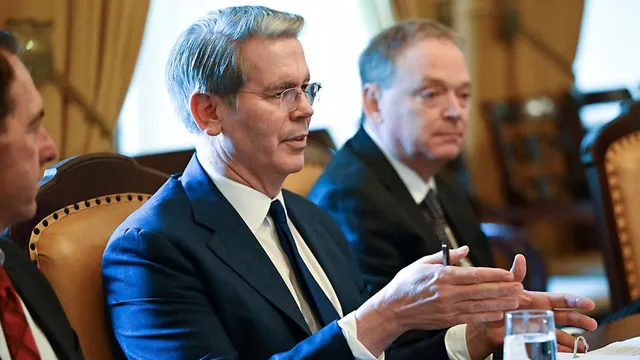- By Ajeet Kumar
- Wed, 20 Aug 2025 07:52 AM (IST)
- Source:JND
US Treasury Secretary Scott Bessent on Tuesday (local time) criticised India's import of Russian oil, saying the country is “profiting” from the ongoing Ukraine war. In an interview with CNBC, Bessent said, "Before the war in Ukraine, less than 1 per cent of India's oil came from Russia. Now it is 42 per cent.”
“The system is allowing India to profiteer by buying cheap Russian oil, reselling it, and pocketing $16B in excess profits. This opportunistic arbitrage is unacceptable,” he added.
On August 6, the US slapped a 25 per cent additional tariff on India for buying Russian oil, doubling the total tariff to 50 per cent and catapulting the country to one facing the highest import duties among Washington's trade partners. New Delhi called the tariff action "unfair, unjustified and unreasonable", and said it would take "all actions necessary" to "protect its national interests".
Before the war in Ukraine, less than 1% of India’s oil came from Russia. Now it is 42%.
— Treasury Secretary Scott Bessent (@SecScottBessent) August 19, 2025
The system is allowing India to profiteer by buying cheap Russian oil, reselling it, and pocketing $16B in excess profits.
This opportunistic arbitrage is unacceptable. pic.twitter.com/zp4FuKs9vJ
India's Russian oil purchase
The US official's remarks highlight concerns over energy trade practices amid the conflict in Ukraine, pointing to India's growing reliance on Russian crude and the financial gains from reselling it. Bessent's statement comes as Western nations continue to monitor global oil markets and assess the impact of trade strategies on the conflict in Ukraine. Against this backdrop, House Foreign Affairs Committee Democrats argued last week that imposing tariffs on India would not stop Russian President Vladimir Putin or bring an end to the conflict.
House Foreign Affairs Committee Democrats urged that, to address that issue, US President Donald Trump must provide Ukraine with the aid it needs and punish Putin directly.
"Tariffing India won't stop Putin. If Trump really wanted to address Russia's illegal invasion of Ukraine, maybe punish Putin and give Ukraine the military aid it needs. Everything else is smoke and mirrors," the organisation said in a post on X.
More secondary tariffs
The committee also uploaded an interview with US Treasury Secretary Scott Bessent, in which he said that if the tariffs on India did not deter Russia, more secondary tariffs could follow. "We've put secondary tariffs on the Indians for buying Russian oil. And I could see if things don't go well, then sanctions or secondary tariffs could go up," Bessent said, adding that Trump would make it clear to Putin what all options are on the table. "I'm not going to get ahead of the president, but the president is the best at creating leverage for himself, and he will make it clear to President Putin that all options are on the table," he said. Bessent described sanctions as a dynamic factor, subject to change.
"Sanctions can go up. They can be loosened. They can have a definitive life. They can go on indefinitely. You know, there's this Russian shadow fleet of ships around the world that I think we could crack down on them. President Trump is meeting with President Putin and the Europeans are in the wings, harping about how he should do it, what he should do it," he said. He said that the Europeans must also join the US in sanctions.
"But the Europeans need to join us in these sanctions. The Europeans need to be willing to put on these secondary sanctions. I was at the G7 meeting in Canada with President Trump, and the Europeans kept talking about Senator Graham's bill to impose secondary tariffs. I looked at all the leaders around the table and asked, "Is everyone willing to impose a 200 per cent secondary tariff on China?" And you know what? Everybody wanted to see what kind of shoes they were wearing," he said.
Trump-Putin summit
Meanwhile, Russian President Vladimir Putin noted during Alaska's press conference with Trump on August 16 that bilateral trade between the two nations has increased by 20 per cent since Trump's reinstatement as President.
"Incidentally, when the new administration came to power, bilateral trade started to grow. It's still very symbolic. Still, we have a growth of 20 per cent. As I've mentioned, we have numerous dimensions for joint work. It is clear that the US and Russian investment and business cooperation has tremendous potential," Putin had said.
"Russia and the US can offer each other so much in trade, digital, high-tech, and in space exploration. We see that Arctic cooperation is also very possible in our international context, for example, between the far east of Russia and the west coast of the US. Overall, it's very important for our countries to turn the page, to go back to cooperation," he added.
(With inputs from agency)

